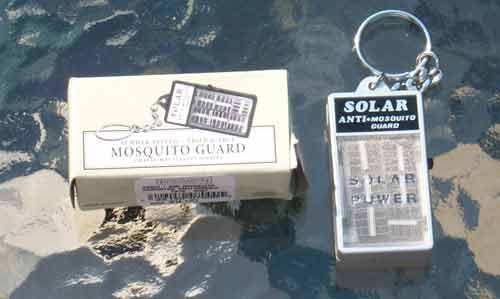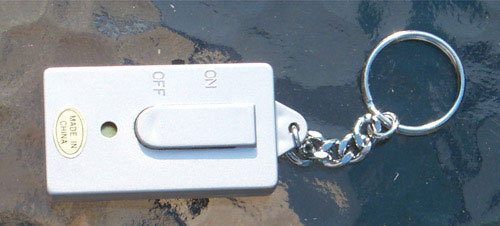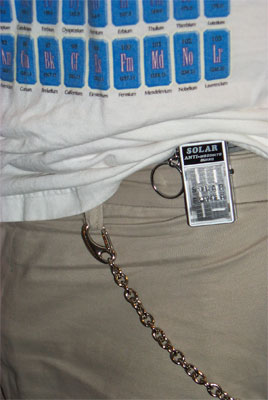Summertime in Pittsburgh, Pennsylvania is mosquito city. I have an ornamental pond in the backyard which is an attraction to mosquitoes to lay eggs. After dark, the yard is practically a Bela Lugosi film festival, there are so many creatures after my blood!
For those of you who are not up on mosquito 411, here are a few facts from mosquito.org, the site for the American Mosquito Control Association, about our blood drinking unwanted summer guests. Female mosquitoes are the ones that bite, requiring blood to nourish her unborn young. Mosquito bites can transmit diseases such as Yellow Fever, Malaria, West Nile Virus, and various types of Encephalitis. A necessary part of gestation, mosquito eggs are laid in water and join together to form "rafts", so any place with water can be a potential incubator.
In the past, I’ve tried several citronella candles and bug sprays with mediocre results. Frustrated and itchy, I decided to give a product from Restoration Hardware (a great gadget store) a try.

The solar powered Mosquito Guard is an interesting concept. It is a key chain (and belt clip) attached to a high-frequency generator. The device is powered by tiny solar panels that recharge in about 5 hours. The sound emitted by the Mosquito Guard repels the mosquitoes away from the user.
Product Details & Features
The Mosquito guard is comes in several colors, is 2" H x 1" W x.5" D inches and weighs about 24.3 grams. An On/Off toggle switch to save power when not in use.

Initial impressions
After opening the box, The device clips easily to belt or waistband and stays there, even in heavy activity. When turned on, I can hear a very soft high pitched noise, likely not the actual frequency that repels the mosquitoes but rather to let the user know that the device is on and charged.
Upon reading the box, I noticed the phrase:
While no scientific evidence proves that mosquitoes can hear, it seems to work for most people.
That doesn’t seem too reassuring. However, a bit of online research showed ultrasonic repellents testing has been inconclusive.
Because, there are many things that science has not yet explained or proven so I donned the gadget and bravely went outside in the interest of mankind.
Product Testing
I decided to charge it up and test it in several situations: using the belt clip during the day, using the belt clip at night, in a pocket during the day, and in a pocket during the evening. Here are my limited (and non-scientific) findings.

Belt Clip Day:
For this portion of the testing, my dad volunteered to be the one wearing the device, while I went out unprotected. We walked our dogs in a grassy area where mosquitoes and other bugs tend to bite. Over the span of 20 minutes I was bitten twice, while my father was bitten three times.
Table top at Dusk: Dusk is prime time for mosquito I put the device in the center of my glass top table while entertaining some visitors. I was bitten once, and my guests were bitten several times.
Belt Clip Night:
For the night test, I recruited my husband to wear the device and go for a walk with me along the same route. I was bitten once, while my husband, who was wearing the device was not bitten at all.
Overall, I was disappointed with the performance of this product. The concept and design are good ones, I just did not believe the mechanism was especially effective. Also, if this key chain is kept into your pocket, the results are reduced even more.
Price: $9.00
Pros:
No chemicals or dead bugs to worry about
Solar Powered
Small and lightweight, perfect for camping or travel
Inexpensive
Cons:
Not particularly sturdy
If kept in a pocket it is not exposed to light and therefore will not recharge.
Not as effective as traditional methods, such as DEET
Can frighten some animals
HP 14 Laptop, Intel Celeron N4020, 4 GB RAM, 64 GB Storage, 14-inch Micro-edge HD Display, Windows 11 Home, Thin & Portable, 4K Graphics, One Year of Microsoft 365 (14-dq0040nr, Snowflake White)
(as of February 15, 2026 09:53 GMT -06:00 - More infoProduct prices and availability are accurate as of the date/time indicated and are subject to change. Any price and availability information displayed on [relevant Amazon Site(s), as applicable] at the time of purchase will apply to the purchase of this product.)HP 16GB Memory Laptop with Microsoft 365-1.1TB Storage - Intel Inside | Anti-Glare Display, 64GB SSD and 1TB Cloud Storage, 2-Cores CPU, Fast Charge and 12hrs Battery, no Mouse
(as of February 15, 2026 23:21 GMT -06:00 - More infoProduct prices and availability are accurate as of the date/time indicated and are subject to change. Any price and availability information displayed on [relevant Amazon Site(s), as applicable] at the time of purchase will apply to the purchase of this product.)Product Information
| Price: | 9.0 |
| Manufacturer: | Restoration Hardware |
| Pros: |
|
| Cons: |
|



Gadgeteer Comment Policy - Please read before commenting
Post your comments here on the Solar Powered Mosquito Guard review.
http://www.the-gadgeteer.com/mosquito-guard-review.html
Just click the POST REPLY button on this page.
I saw a 60 Minutes report on mosquito devices, and the only items that were shown to work were deet and carbon dioxide emitters. Bug zappers, candles, and ultrasonic devices had no effect on mosquitos.
If you’ve got a yard, your best bet is a carbon dioxide based mosquito trap. They are NOT cheap, starting at $150 for a mere half acre unit. Also you need to run them for a few hours ahead of time to kill off the local mosquito population before using your yard. But at least it works.
This device seems similar to those AA-battery powered mosquito repellants that sells around here for $2. They don’t work. I live in the tropics where mosquitoes are as common as used-car salesmen, and even more reviled. Bought these battery powered mosquito thingies, and all I can say is that the mosquitoes didn’t seem to mind them one bit.
For the most part, I believe (after many itchy bites during product testing) that the effectiveness of this method (ultrasonic) is questionable.
However, if you are looking for some good resources for scientific data on a variety of mosquito management methods here are a few I have found:
Colorado State
The Center for Disease Contol (CDC) West Nile Virus Page
Enviornmental Protection Agency (EPA) Mosquito Page
The American Mosquito Control Association
Electronic frequency emitters don’t really work against Mosquitoes. Why I know? Because the manufacturer said so. 😮
In Asia, there is a tiny unit that looks very pretty and plugs directly into the AC socket. Like this solar powered unit, it emits a high pitched sound.
I happened to know a friend that knows the manufacturer. The company sells hundreds of thousands of these units per month for only $3 each and the owners admits that they don’t work. They also said that it didn’t matter so long as the little units were selling like hot cakes! The price is so low that people would just buy them for fun and forget them after a while.
High sound frequencies do irritate mosquitoes but each species of mosquitoes is sensitive to only a particular frequency. And whether the irritation is sufficient to stop biting is anyone’s guess. I know as I have tested various frequencies on stationary mosquitoes and at one frequency (and only one for that particular species), the mosquito starts shaking.
Either irritated or dancing, not quite sure! 😀
I have had this same gadget for about 3 years, and it works great for me. I live in south Florida and like to walk at dusk. I slip one of my fingers through the key ring and take off, I get no bites. Many times I stop and talk with a neighbor, usually they are swatting and hitting as we talk but I am fine.
I HAVE HAD THIS UNIT FOR SEVERAL YEARS, AND SO FAR I LIKE IT FOR KEEPING THE MOSQUITOES AT BAY. EVERYONE’S MAKE-UP IS DIFFERENT THOUGH. I HAVE GONE OUT WITHOUT IT, AND GET BITTEN QUITE A BIT. WHEN I HAVE IT ON, I NORMALLY DON’T GET BITTEN. DRINK LEMON WATER, THAT SEEMS TO HELP AS WELL.